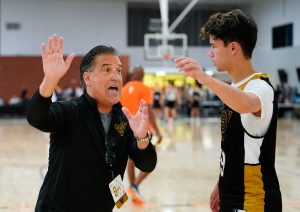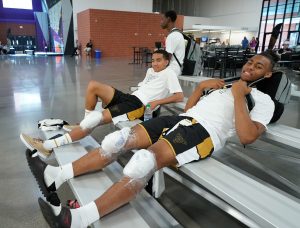- Slug: Sports-NCAA Basketball Academy. 720 words
- Photo, caption below.
By Sebastian Emanuel
Cronkite News
PHOENIX – In an attempt to address issues surrounding summer basketball that sparked the involvement of the federal government, the NCAA Basketball Academy made its four-region debut recently.
One of the sites was Grand Canyon University.
The camp, also held at Illinois, Connecticut and Houston, was designed to give top high school basketball players an idea of life at the college level. The message was sent not only through drills and competition but through life skills sessions including social media education and eligibility rules.
It was also a way for the NCAA to respond to the 2017 college basketball corruption investigation by keeping at a distance shoe companies and agents.
Coaches could be there. Shoe company representatives couldn’t.
“As we get younger players into college basketball and to the professional ranks, having them be prepared both physically, mentally and emotionally is our responsibility in some ways,” said Dan Gavitt, the NCAA’s senior vice president of basketball.
Approximately 1,200 players attended the free academy at the four locations. Some top-ranked players were there but many, according to scouting services, were those more destined for mid-majors.
Steve Lavin, the commissioner of the West Region academy at GCU and former coach at UCLA and St. John’s, said the NCAA had a short window to launch the camp but future meetings will determine how to improve it.
“Now we can go back in a couple weeks and modify and look at the selection process,” Lavin said. “Consider the dates in the summer period that makes the most sense.”
Among the players taking part in the GCU camp were senior forward Lucas Haupt (San Diego), junior forward Tre Carroll (Punta Gorda, Florida) and guard Hunter Sallis (Omaha, Nebraska). All three players were involved in daily drills, life-skills education and games during their stay.
“Waking up in the morning and having to come over here and then do drills and doing the optional work,” Sallis said. “It’s really getting us prepared for college and what college is going to be like.”
Haupt said that he wanted to come to the camp and the opportunity has been good for him to showcase his skills.
“They talked to us about how to improve some of our skills on the court like our athletic ability,” Haupt said. “They also talked to us about making sure we are eligible and gives us a better understanding of the NCAA rules.”
The camp isn’t just focused on improving the high school players’ basketball abilities. It’s also preparing them for the daily routine of a college athlete.
“There’s a whole life skills program that is going on with this,” Gavitt said. “A couple of the components are around academics and what kind of high school grades and test scores you need in order to qualify to be a college basketball player to receive an athletic scholarship.
“That’s very valuable information from not only the prospects but the parent or guardian who is here with them as well so that they can lay out their academic plan for high school. Having these things on college campuses in classrooms and having college like drills and games and college officials is all a part of the plan here to expose them to what college basketball is like.”
Carroll said the life-skill classes were valuable because “I learned some stuff that I didn’t know before like some of the courses and the ACT/SAT (information). This is a big help. It even helps when I go to college because I’ll know what to expect.”
The day in the life of a college athlete isn’t easy, Lavin said.
“It’s study hall, weights, individual workouts, regular scheduled practice, film work, scouting reports and a full load of classes, study hall. Little idea, a glimpse of what it’s like at the higher level of college athletics.”
The NCAA Basketball Academy is in its first year but Gavitt knows that a longterm vision will help the academy continue to grow.
Lavin agreed.
“I don’t think anyone is naive to think that this is a quick fix,” he said. “This is the first step of a long journey as we continue to work cooperatively with people from USA Basketball, the NBA, NCAA, the NABC (National Association of Basketball Coaches) to try and improve the game and protect what’s great about the game.”
Follow us on Instagram.
For more stories from Cronkite News, visit cronkitenews.azpbs.org.

